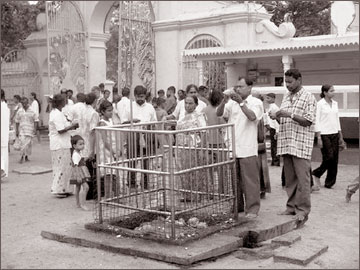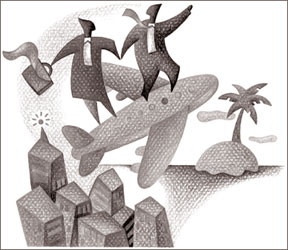Desire to roam -inherent in man
.jpg) Anyone
who visits the sacred cities of Anuradhapura and Kataragama will wonder
why people in their thousands congregate in such places. During the
Poson festival, Anuradhapura becomes a sea of heads. During the Esala
festival, Kataragama attracts thousands of people from many parts of the
country. Some devotees come walking all the way from Jaffna. Meanwhile,
a large number of foreigners can be seen walking bare-footed along the
dusty roads of the sacred city. Anyone
who visits the sacred cities of Anuradhapura and Kataragama will wonder
why people in their thousands congregate in such places. During the
Poson festival, Anuradhapura becomes a sea of heads. During the Esala
festival, Kataragama attracts thousands of people from many parts of the
country. Some devotees come walking all the way from Jaffna. Meanwhile,
a large number of foreigners can be seen walking bare-footed along the
dusty roads of the sacred city.
 Why
do we travel? What prompts us to leave our comfortable zones and stay in
cheap hotels partaking simple meals? According to geographers, there are
'push' influences such as war and disease to leave our traditional
homes. Then there are 'pull' influences such as hope of recovery from an
illness or success in business and examinations, I think Anuradhapura
and Kataragama attract people for the second reason. Why
do we travel? What prompts us to leave our comfortable zones and stay in
cheap hotels partaking simple meals? According to geographers, there are
'push' influences such as war and disease to leave our traditional
homes. Then there are 'pull' influences such as hope of recovery from an
illness or success in business and examinations, I think Anuradhapura
and Kataragama attract people for the second reason.
People who go to Anuradhapura take flowers and joss-sticks to offer
at religious places. However, those who visit Kataragama take many other
offerings such as fruits, garlands of flowers and incense to be placed
at the feet of numerous images of Gods ranging from Skandha, Vishnu,
Mahasen, Saman and Upulvan. After waiting in a long queue they hand over
the tray of fruits to the Kapurala. Very often a few currency notes are
placed in the tray to attract the attention of the Kapurala. All these
activities take place in a very calm and serene atmosphere.
Whether you travel around the world or occasionally make a trip to a
distant place in the island, the desire to put yourself in another
situation and, perhaps, to be caught in the dramatic tension between two
places, appears to be inherent in your genes.
We learn about wandering tribes in history. Archaeologists tell us
that our distant ancestors came from Africa before dispersing to other
countries. This is perhaps one reason that prompts us to visit distant
places, depending of course on our resources.
Although some of us travel occasionally there are some tribes that
remain nomadic by nature. For instance, the Rodiyas do not stay in one
place for a long time. The Kyrgyz and Kazakh tribes of Central Asia
migrate regularly depending on the seasons. Although the respective
governments are trying to keep them in one place permanently, they still
follow the ancient instinct for travel. Many other tribes in America,
Africa and Asia are always on the move searching for food and shelter.
Even in agricultural societies where people are rooted to their
surroundings, there is a subconscious desire for travel.
Some people are reluctant to leave their homes and suffer the
inconvenience in distant places. However, most people, particularly
children, love to travel and enjoy the experience. They do not mind
walking bare-footed or sleeping under trees. But some adults who belong
to the affluent class look for air-conditioned rooms in places such as
Anuradhapura and Kataragama.
 Do
travellers consider it something romantic to be on the move? Or is it
something basic to human nature? The Finnish ethnologist, Dr. Edward
Westermarck in his path breaking book "The Wandering Spirit" says that
human migrations are not due to a wandering instinct or restlessness.
According to him, we feel like leaving our comfortable zones because
there is a natural inclination for movement, subject of course to
certain stimuli. Do
travellers consider it something romantic to be on the move? Or is it
something basic to human nature? The Finnish ethnologist, Dr. Edward
Westermarck in his path breaking book "The Wandering Spirit" says that
human migrations are not due to a wandering instinct or restlessness.
According to him, we feel like leaving our comfortable zones because
there is a natural inclination for movement, subject of course to
certain stimuli.
According to many religions, devotees consider travel and suffering
would help them to solve some of their mundane problems.
Classical literature gives us some clues as to why people are willing
to undergo physical pains to attain spiritual improvement. For instance,
Homer's Odysseus goes on a ten-year voyage of suffering and redemption
after the Trojan War. After visiting many fantastic places, including
the Other world, he finally returns to Ithaca as an enlightened man.
My own experience as a traveller to distant places in Sri Lanka,
India and Malaysia leads me to think that Westermarck's theories are
correct. As he points out there is a huge difference between the
migration of birds and the movement of people. One common factor is that
birds and human beings want to survive.
Modern transport facilities and improved roads help people to travel
speedily and safely. For instance, when I visited Kataragama a few years
ago, I had to climb Vedahitikanda with great difficulty. However, when I
visited Kataragama last week, there were double cabs waiting to take me
to the summit of the hill. Although the trip was quick and comfortable,
it did not give me the sense of suffering inherent in such journeys.
Even in my old age I would love to climb Vedahitikanda bare-footed!
|

